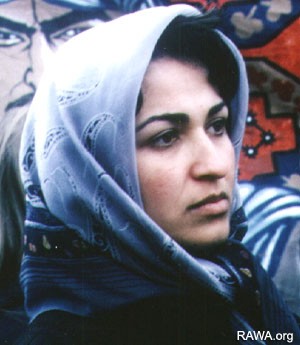- The Revolutionary Association of
the Women of Afghanistan (RAWA) has been active for over a decade. It is
a left-of-center group which does not advocate violence. RAWA campaigns
for women’s rights and provides education and health facilities for women
and children. It has set up a number of educational and health programs
in Afghanistan but has had to scale down these operations because of the
threats it receives. Most of its operations are based in Afghan refugee
areas in Pakistan. These include several well-organized schools in Peshawar
and Quetta and a health center in Quetta. Even in Pakistan RAWA’s leaders
continue to receive death threats from Mujahideen groups, and several have
had go into hiding in fear of their lives. Meena, a health
worker and founding member of RAWA, was assassinated along with two members
of her family in February 1987 in her house in Quetta. The circumstances
of the killing and testimonies received by Amnesty International from independent
sources and witnesses strongly indicate that the assassins may have been
closely linked to Hezb-e Islami. Prior to her assassination, Meena
had received repeated death threats for her "anti-jehadi [holy
war]" activities. These reportedly related to her trips to Western
Europe where she made public statements about the situation of Afghan women
both in Afghanistan and in refugee camps controlled by Afghan Mujahideen
groups in Pakistan. Although she informed the Pakistani authorities of
the threats, she reportedly received no protection from the police. When
the bodies of Meena and her two relatives were found, a number
of Pakistani daily newspapers closely associated with the government portrayed
the victims as agents of the then Afghan secret police. RAWA members denied
the allegations and urged the police to investigate the killings and bring
those responsible to justice. The Pakistani police, however, reportedly
took no effective action. RAWA leaders, fearing assassination by Islamist
groups or politically motivated arrest by the Pakistani police, went into
hiding. In February 1989 RAWA members reportedly planned a demonstration
to protest against the failure of the Pakistani police to provide adequate
protection to RAWA leaders, to highlight the problems faced by Afghan women
opposed to both the Kabul government and the Mujahideen groups, and to
press the Pakistani authorities to bring to justice those responsible for
the killing of Meena and her family members. Prior to the
demonstration, however, the police raided the houses of some RAWA leaders
in Quetta, reportedly at the instigation of Hezb-e Islami and other Mujahideen
groups. The demonstration was reportedly canceled.
A RAWA activist described to Amnesty
International in late 1994 the problems her organization had been facing:
"We are working for Afghan women’s welfare in Pakistan. We are being
threatened. We receive written threats. We are not allowed to provide the
much needed education for Afghan women. We cannot even raise the women’s
understanding of their own rights. There are Islamic Youth groups affiliated
to Gulbuddin Hekmatyar’s party [Hezb-e Islami]. He has warned women not
to go to public places and to wear Islamic clothing. The Islamic Youth
members question Afghan young women in the streets about the reason why
they are out of their homes. There are clinics in Islamabad, for instance,
providing free medical treatment of Afghan women. The group stops women
from going there, objecting to Afghan women being treated by a male doctor.
We cannot distribute our publications or educational cassettes. Any shops
selling these can have serious problems. The Islamic Youth members take
away these and create serious problems for the shop-keeper selling them.
Some have been threatened that if they sell any more of our publications,
they will be killed. The Pakistani police are reluctant to act against
these atrocities.
|


